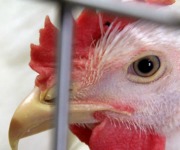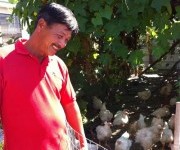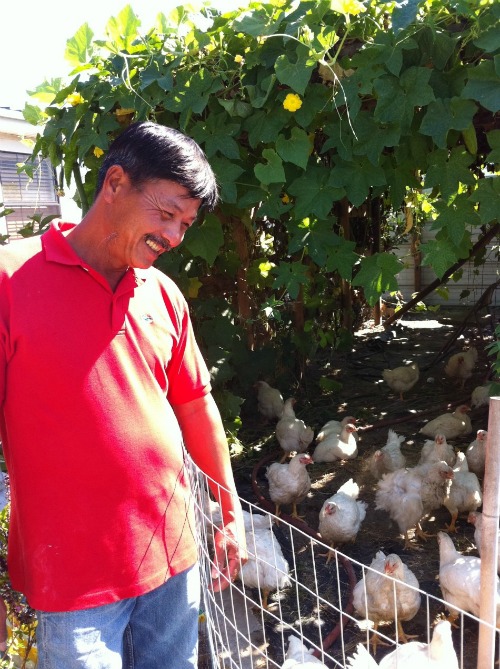
Phuong Nguyen in his backyard garden. (Photo by Nina Kahori Fallenbaum.)
Editor’s note: This is the first half of a feature story from Hyphen Magazine’s Survival Issue.
Some say that Asian America began in Louisiana. In the late 1700s, Filipino sailors escaped Spanish galleons and started shrimping the hot, humid Gulf Coast, where the weather reminded them of Southeast Asia and the water teemed with oysters, lobsters, scallops, crab, crayfish, and shrimp. After the Vietnam War, new waves of Vietnamese and Cambodian immigrants settled in the area, indelibly shifting the region’s mix of food, culture, and history.
But neither history nor affinity could protect New Orleans-area Asian Americans from the multiple disasters of the last six years. Neighborhoods were just beginning to recover from 2005’s Hurricane Katrina when the Deepwater Horizon oil rig exploded in April 2010. Fishermen watched the news nervously, hoping the spill would be contained quickly. It wasn’t. The oil — between 55,000 and 62,000 barrels a day — flowed for 87 days into the gulf before it was capped.
For the Vietnamese Americans in the area whose labor — fishing, cleaning, sorting, packing, cooking, and selling — makes up about one-third of the gulf’s seafood industry, any hard-won stability after Katrina suddenly vanished. But this disaster presented no riveting Superdome, no wrenching images to engender sympathy and assistance — only an ongoing series of setbacks and recalculations for this community that has been so central to the ocean economy for decades.
They now face protracted compensation battles, diminished business, and skepticism about the future. Yet as local Vietnamese Americans apply some entrepreneurial thinking and a rolling up of sleeves to work the land instead of the sea, a new chapter of Asian America seems set to begin in the region.
“The bread will rise again — it just kneads time.” – sign on Vietnamese-owned Le Bakery and Cafe in East Biloxi, Miss.
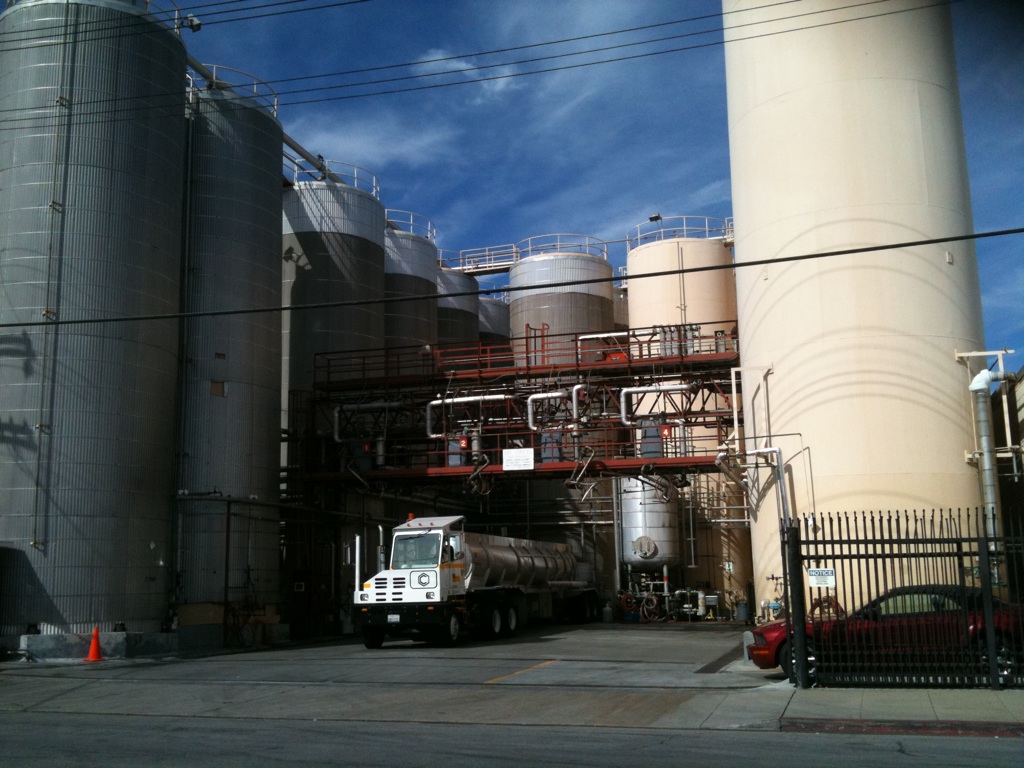
Photo by Nina Kahori Fallenbaum.
Shortly after the spill, the Rev. Vien Nguyen of the largely Vietnamese New Orleans parish Mary Queen of Vietnam travelled to Cordova, Alaska, to understand how long it would take for New Orleans to recover. What he saw there, at the site of the 1989 Exxon Valdez oil spill, alarmed him. Cordova’s local fish, such as herring, continued to appear for the first three years after that spill, but then disappeared. Scientists say herring need four years to grow from spawn to eating size; the spill occurred right at spawning time. When Nguyen visited over two decades later, the fish still hadn’t returned to Cordova. “Will it ever return to normal?” he asked. “We don’t know.”
When the BP oil spill started gushing into fishing waters, it hammered an industry that had been struggling for years. Until the early 2000s, the gulf provided most of the shellfish eaten in the United States. In the last decade, however, the growth of commercial fish and seafood farming in Southeast Asia (and the subsequent influx of low-cost seafood) has bitten deep into the American seafood industry. Vietnamese Americans had been picking up the slack in a backbreaking industry few Americans wanted to do, but these economics have made it even harder for them to make a living.
Phuong Nguyen has worked in and out of the crab industry for 30 years. He learned how to fish in Vietnam before immigrating in 1982, eventually buying his own boat and house after many years of hardscrabble work.
“They say fishing is for people without degrees,” he said. “When you have a degree, you find some other job.” He said, laughing: “There is no college or anything down here. We’re 20 miles to the end of the world.”
Before the spill, Phuong Nguyen worked full-time as a commercial crabber for seafood restaurants and wholesalers in the New Orleans area. Now he passes time by tending his backyard chickens, trimming his rosebushes, and watching the ocean and his finances in equal measure.
Most of his neighbors work two or three jobs, trying to diversify their incomes while they wait to learn whether the gulf is safe. He raises chickens for eggs and meat and grows herbs, zucchini, cauliflower, and other vegetables in his backyard. While he received some relief money from BP, he’s not sure if fishing in the area will ever become a viable occupation again.
As a fisherman who still eats his own catch (the waters are sporadically opened for fishing), Phuong Nguyen feels confident about the safety of gulf seafood post-spill, primarily because local health department officials check contaminant levels almost daily before determining whether fishermen can sail out.
While some customers may have hesitated after the spill to buy frozen seafood labeled “Gulf Coast,” consider this: 84 percent of seafood eaten in the United States is imported, and almost none of it is checked for impurities or the presence of antibiotics, which are routinely used in high-density fish farms to quell infections. This gaping hole in our food safety regimen has increased interest in wild-caught, domestic seafood — the kind that Phuong Nguyen catches.
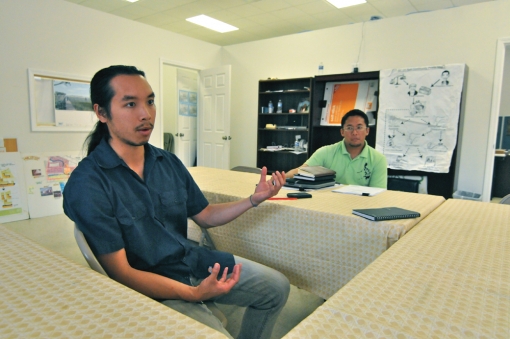
Daniel Nguyen and Leo Esclamado of Mary Queen of Vietnam Community Development Corporation describe the BP claims process and their work to assist claimants. (Photo by Lisa Cates.)
To get to Phuong Nguyen’s house in Buras, you take Louisiana Highway 23 about an hour and a half from New Orleans, along the final threads of the mighty Mississippi River before it empties into the Gulf of Mexico. On your left are hulking white cylinders and the triple-fenced security perimeters of the refineries. This is the oil economy, processing the oil that we pump in our cars, that becomes plastic, that fuels our air conditioners. According to the Department of Energy, approximately 37 percent of the energy Americans use comes from petroleum. Its main use is for transportation: cars, trucks, and planes to carry us and the products we consume. The agency reported in January that American oil refining was at its highest levels since 1982, with almost half of that refining going on in the Gulf Coast.
On your right is where the locals live. From rambling houses dotted with chickens and old cars, local anger and pride spill equally from hand-scrawled signs tacked to the fences: “Damn BP!” and “God Bless America.” Gas stations stock fishing lines and nightcrawlers in plastic foam boxes next to the Cokes. This is the fish economy.
To the tourists enjoying New Orleans’ restaurants or Biloxi’s casinos, the fish and oil economies are largely hidden from view. Even more hidden are Vietnamese American families and their contributions.
“The government and BP claim they have scooped up 75 percent of the oil,” the Rev. Nguyen said, a note of anger rising in his voice for the first time. “But will we be like Alaska, where the first three to four years we don’t see it? But then when we see it, it’s too late?” he asked. Mother Jones reported that oceanographers found the chemical dispersant used to break up the oil as far as 200 miles from the well head, and three months after the accident, much of the oil still had not broken down. Government agencies responsible for both environmental and human health agree that the use of this chemical is experimental, with unknown effects.
The twisted relationship between the oil and fish economies is nowhere more evident than in the protracted compensation battles that began almost immediately after the spill.
For families whose income came in both dollars and fish, it’s difficult to quantify the losses from the spill. Local fishermen like Phuong Nguyen have long eaten, traded, and shared their commercial catch. People fished for their own families, brought crabs to church picnics and traded for things they didn’t catch.
When BP and the U.S. government began devising a system to compensate losses, these non-commercial “subsistence uses” were either left out or worse, accused of being fraudulent. A group of pro bono lawyers and community activists are now advocating for Asian American fishing families who’ve suffered significant loss of subsistence use. They hope to convince Kenneth Feinberg, claims administrator for BP’s compensation fund, that not all losses can be shown in ledger books.
There are laws designed to protect victims of large-scale environmental disasters (the Oil Pollution Act and Clean Water Act among them), but their parameters are hard enough for native English speakers to understand, let alone those that struggle with written English or are not literate in any language.
Jennifer Vu is a New Orleans native and former staffer of former Rep. Joseph Cao (R-La.), the first Vietnamese American elected to Congress. Her office joined local groups to hold multilingual information sessions after the spill and criticized BP for failing to provide information for limited-English speakers.
“Feinberg still hasn’t held an interpreted town hall,” she said, six months after the spill. While over 16,000 subsistence use claims have been submitted to the Gulf Coast Claims Facility, just two Vietnamese families have been paid so far, at less than $5,000 each. According to Vu and others assisting the claims process, what’s most needed now is nationwide awareness and legal assistance as residents and community groups prepare for what may be long, drawn-out court battles.
Next: Hear from the owners of a lunch counter on the impact of the BP oil spill on the Asian-American culture in New Orleans in Part 2.
